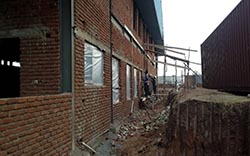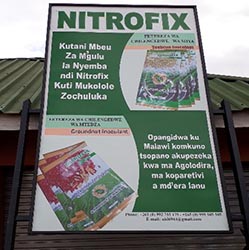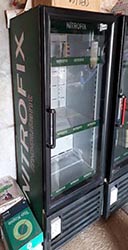Prior to 2015, awareness of the advantages of soyabean inoculation was created among farmers in Malawi by N2Africa, but soyabean inoculant remained largely unavailable to farmers. Inoculant production was mostly limited to research (with only a few hundred sachets being sold to farmers) through the government’s Department of Agriculture Research Services (DARS). This public institution was unable to scale its production to meet the inoculant demand. This was the situation until 2015, when Agro-Input Suppliers Limited (AISL) stepped in to upscale and commercialize the production and distribution of inoculant branded as Nitrofix. DARS granted them authority.
Since 2015 with an initial production of 20,000 sachets from a temporary laboratory facility and 10 retail outlets, AISL has managed to increase production to 250,000 and 25 retail outlets by 2017. N2Africa provided technical support, provided training to two technicians at Ibadan’s laboratory and facilitated the acquisition of elite rhizobium strains.

|
AISL constructed a permanent laboratory which will be fully equipped with necessary laboratory equipment for the production of inoculants. Expected production capacity at the new facility is 1 million sachets. Besides soyabean inoculant, the company started with the development of inoculants for groundnuts and beans, together with the DARS. |
| AISL invested in the distribution chain by procuring 15 solar energy-driven coolers for proper storage of Nitrofix distributed in 15 of its outlets. Plans are underway to place more coolers in the remaining outlets. |  |
 |
Ultimately, AISL plans to grow and meet the domestic demand through improvements in the laboratory’s production capacity and a larger number of outlets over the next 3 years. It will also seize opportunities to export its products to neighbouring Zambia, Mozambique, and Zimbabwe.
Fredrick Kawalewale, Chief Executive Officer for AISL
